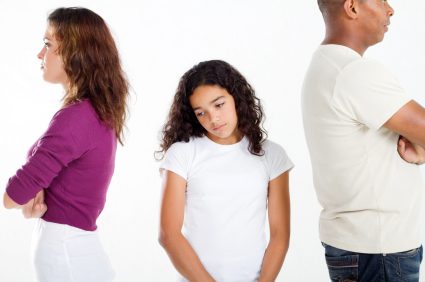
Regardless of the reason for a divorce, it is still a very difficult time for everyone, especially children.
According to the publication “The Effects of Divorce on America” by Fagan, Fitzgerald and Rector, 50% of all children born to married parents today will experience the divorce of their parents before they turn 18 years of age.
That’s a staggering number.
Many of these children go through several negative effects due to divorce as well.
In the study of children who had experienced the divorce of their parents six years earlier titled, “The Long Term Effects of Divorce on Children,” by Wallerstein and publicized by the Journal of the American Academy of Child and Adolescent Psychiatry, it was found that these children had a high rate of unhappiness, anxiety, insecurity and loneliness even after all those years.
Hence, effectively helping your children cope with your divorce is not only necessary for the short term but is also essential in ensuring that your children live happier and healthier lives moving forward.
Be Honest
Parents are often tempted to tell their children the bad news but say it in a way that they hope will make their children feel better.
Hence, they throw in some white lies here and there or mask the truth.
In this crucial time, it is important to be very honest with your children about the divorce.
You don’t have to give them every detail about why it is happening, but honesty is required.
Being honest simply means that you tell your children what’s about to happen and let them know that their parents are not going to be living together anymore.
Avoid making promises that you know aren’t achievable or even sustainable.
Don’t give them false hope.
This is unfair to your children.
Though it may hurt, just be honest with them.
Be Reassuring
Many children tend to feel that their parents’ divorce was their fault.
They will begin to feel guilty and wonder what they did wrong. This ultimately leads to psychological problems.
In a study by Peter Hill titled, “Recent Advances in Selected Aspects of Adolescent Development” and publicized by the Journal of Child Psychology and Psychiatry, it was found that children of divorce were 35% more likely to need psychological help within a year of their parents’ divorce.
This is also partly attributed to the sense of guilt that the children have.
Hence, reassuring your children that the divorce was due to no fault of their own is highly crucial in helping them cope with it.
Be Encouraging And Ask For Their Thoughts
Often, children can freeze up during a divorce.
They may be afraid to express their feelings out of fear of hurting either parent or seeming to be on the side of one over the other.
At this difficult time, asking for your children’s honest thoughts about the divorce is helpful both to your children and to yourself.
By encouraging your children to tell you how they are feeling, you prevent them from allowing those feelings to remain locked up inside and eating away at them.
If thoughts and feelings aren’t addressed openly, your children could easily experience both psychological and physical problems as they develop.
They may also choose to express these feelings through misbehaving at school or even being violent.
As for the benefit to you, you will have insight to your child’s true thoughts and feelings thereby allowing you to handle and address them as best you can.
Maintain Their Routine
Divorce can easily lead to a disruption in routine.
Now that a spouse is missing in the household, there may be a vacancy in certain duties that the spouse used to perform with the children.
You should try to assume some of those responsibilities to the best of your ability.
There is no doubt that life is going to change for them but your intent should be to let them ease into that change.
If there is too much of sudden change in lifestyle, it makes it that more difficult for them to cope.
Speak Kindly of Your Spouse
It’s important to speak kindly of your spouse whenever you are around the children regardless of whether the divorce came about due to infidelity, abuse, financial troubles or the like.
Your children will find it very difficult to cope with the divorce if they are constantly hearing bad things said about the other parent.
A parent they so happen to love as well.
This is an adult affair between your spouse and yourself.
Whatever angst or frustration you may have toward your spouse should not be forced upon your children.
If you feel the need to release this angst or frustration, do so among your trusted friends or even a counselor, not your children.
Prepare Them And Ask For Their Support
Parents are typically so preoccupied with protecting their children that they often forget that their children may be stronger than they realize.
In being honest with your children about this divorce, you also have to ensure that you prepare them for what is to come.
Let them know that life will change.
Where parents tend to fail is in not asking their children for their support or by doing so in the incorrect way.
This is not about asking them to support one parent over the other. This is about asking them to be strong for both parents at this difficult time.
Making this request of your children gives them a sense of importance in this whole ordeal as opposed to feeling insignificant and blameworthy.
You want them to feel like they are contributing in a positive sense and lending their strength.
By instilling a sense of purpose in them, they are less likely to develop negative psychological effects due to the divorce.
No matter how difficult it gets, your children can survive this and possibly learn a thing or two about decency and strength.
Give them the benefit of the doubt and help them cope.